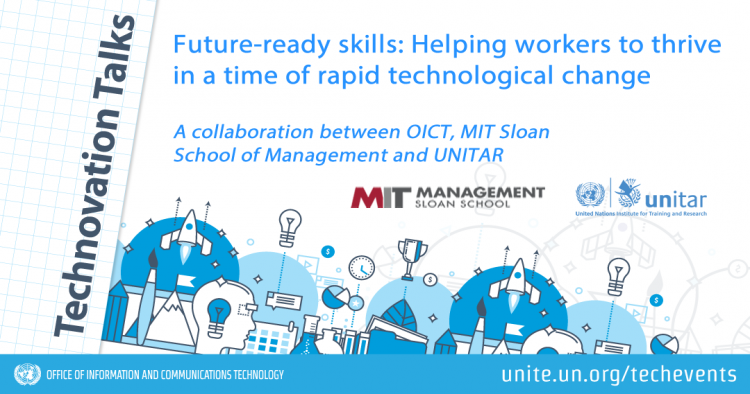FUTURE-READY SKILLS: Helping Workers to Thrive in a Time of Rapid Technological Change
FUTURE-READY SKILLS: HELPING WORKERS TO THRIVE IN A TIME OF RAPID TECHNOLOGICAL CHANGE
A COLLABORATION BETWEEN OICT, MIT SLOAN SCHOOL OF MANAGEMENT AND UNITAR
Tuesday, 15 January 2019
9:30am-12:30pm, with optional workshop 2:00pm-4:00pm
Conference Room 9 (CR-9) - Secretariat Building
Fast-moving technology innovation is changing the economics of machine and human involvement in occupations. While different workers are affected in different ways, we are beginning to understand the patterns though which machine learning, robotics, sensors, and other technologies have affected jobs and may continue to do so. Computers will not eat all jobs, but they will profoundly change many of them. Technology has profound implications for the skills that people need. It also provides new ways to help workers gain skills and a new set of skills to power jobs.
This seminar will have two parts. In the morning, we will examine what is happening and what is possible. We will start by sharing insights on how technology is reshaping the occupational landscape and what the future may hold. Next, we will discuss ways in which employers, schools NGOs are already preparing workers for new and better jobs through methods such as online courses, gamified assessments, refugee education programs, blockchain certificates, hybrid online/offline degree programs, and novel methods of on-the-job training. Then we will examine ways in which the United Nations and MIT, in collaborating with governments and other interested parties around the world, can help to people gain the future-ready skills to succeed in an increasingly technology-powered world.
In the afternoon, interested participants will reconvene to consider specific solutions. Not every solution needs to be technology enabled, and not every worker needs to be a technology worker. But many workers can benefit from skills to use technology or to adapt to the changes that technology brings to their jobs. Many of the tools already exist in online, offline and hybrid programs around the world. Countries and companies are starting to understand the need to make their people more future-ready. In this session, we will work together to identify potential projects and collaborating institutions. We will also consider how to turn our initial conversations into a broader movement that can improve the lives of millions of workers around the world.
DRAFT AGENDA
9:30-9:40 Welcome. Salem Avan, OICT
9:40-9:55 Technology and the Future of Work: George Westerman, MIT
9:55-10:15 Panelist 1: Aishwarya Nadgauda, Cognitive Exchange
10:15-10:35 Panelist 2: Ram Katamaraja, Refactored.ai
10:35-10:55 Panelist 3: Rachel Micha-Jones, Contratados
10:55-11:10 Break, possibly including video vignette of SOLVE or IIC Finalists
11:10-11:30 Panelist 4: Tracy Tan, MIT, Open and hybrid approaches to skill building
11:30-11:50 Panelist 5: Paul Falzone, PVI Wanju Games
11:50-12:05 Re-Envisioning Workplace Learning: George Westerman, MIT
12:05-12:25 Q&A for attendees and panelists
12:25-12:30 Closing and invitation to the afternoon workshop: Lambert Hogenhout, UN
PARTICIPANTS
- Paul Falzone, PVI Wanju Games, Using basic telephony technology to train rural dwellers in 21st century skills in Sub-Saharan Africa and Southeast Asia using a gamified distance-learning format.
- Ram Dhan Yadav Katamaraja, Refactored.ai, on-demand reskilling platform to help all workers -- regardless of age, race, income, or current occupation—gain the skills to succeed in an AI-driven future.
- Rachel Micah-Jones, Contratados, a platform that empowers migrant workers to make informed work choices about employers and employment conditions.
- Aishwarya Nadgauda, Cognitive Exchange, non-profit using peer-based education to teach presentation, debating, and critical thinking to students in India and around the world.
- Tracy Tan, Director, Micromasters program, MIT Office of Open Learning
- George Westerman, Principal Research Scientist, Workforce Learning, MIT Jameel Education Laboratory
- Lambert Hogenhout, OICT
- Several IIC and SOLVE finalists via recorded video segments
ABOUT THE TECHNOVATION TALKS & WORKSHOPS
OICT organizes this ongoing series of conversations to raise knowledge among Member States, Civil Society, and UN personnel on innovative ways in which technology can be applied to our work.


